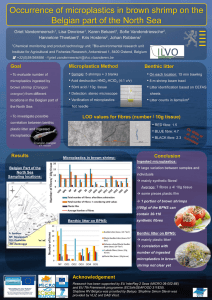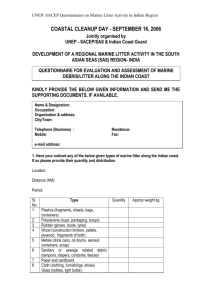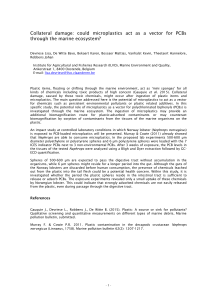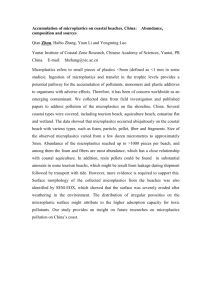Introduction of the Global Partnership on Marine Litter (Part 2)
advertisement
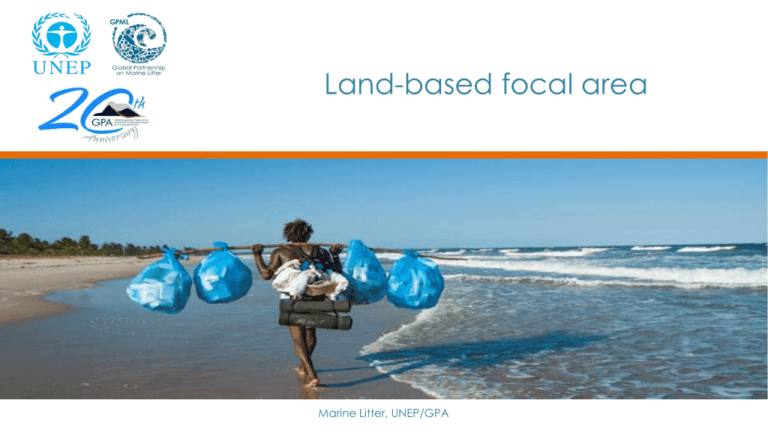
Land-based focal area Marine Litter, UNEP/GPA UNEA Resolution First session of the United Nations Environment Assembly – Resolution 1/6 on Marine Plastic Debris and Microplastics: Encourages Governments, intergovernmental organizations, industry and others to cooperate with the Global Partnership on Marine Litter Emphasizes that further urgent action is needed and encourages Governments and the private sector to promote more resource-efficient use and sound management of plastics and microplastics Requests UNEP to provide support to the development of marine litter action plans upon request by countries Request UNEP ED to present a study on microplastics to UNEA-2 Regional Seas Conventions & Action Plans History of the GPML • The Global Programme of Action for the Protection of the Marine Environment from Landbased Activities (GPA) was adopted in 1995 and is hosted by UNEP • The GPA is the only global intergovernmental mechanism directly addressing the connectivity between terrestrial, freshwater, coastal and marine ecosystems. Marine Litter is one of the priority source categories • The 3rd Intergovernmental review meeting in 2012 recommended the establishment of a Global Partnership on Marine Litter (GPML) which was subsequently launched at the Rio+20 meeting under the auspice of the GPA. • The first Partnership forum was held October 2013 Action plans/nodes/networks ML Action Plans: Regional: Mediterranean, Caribbean, (Northwest Pacific, OSPAR, HELCOM) National: Nigeria, Municipal: Panama, Peru, Ecuador, Chile, Colombia, Brazil (draft Niteroi) Under discussion: Regional Strategy on ML for Africa, Black Sea Nodes/networks: Regional GPML nodes: Northwest Pacific Environmental Cooperation Center (NPEC), host organization of NOWPAP CEARAC, has established NW Pacific Regional Node (http://www.npec.or.jp/ NWPacific_node/) with support of GPA. In the pipeline: Caribbean, Mediterranean, South Pacific National: Portuguese partnership/network, Brazil, Under discussion: Network for South Africa Implementation: General An e-book (YB) and brochure on microplastics Valuing Plastic publication (2014) – Trucost and Plastic Disclosure Project 13 billion USD per year Plastics in Cosmetics – is our personal care polluting the environment?(2015) Factsheet Series of short papers Biodegradable plastic Microplastic and foodsafety Implementation: Waste minimization, Samoa The project included four main components: • community and media awareness; • improved waste management in the ports of entry into Samoa (Port & airport); • waste disposal facilities within the UNSIDS venue and the accommodation providers; • working with the communities to improve waste practices in Apia areas. This also included e.g. provision of litter booms in major contributory rivers and upscaling of waste through craft workshops. • 10 minute documentary: https://www.youtube.com/watch?feature=player_embedded&v=FibX2E6xydI Implementation: Waste minimization, Samoa Implementation: Phase out microbeads • Supported Internationalization of the “Beat the microbead” initiative (PSF and NF) Many personal care products and cosmetics contain plastics Now 70 NGO’s from 33 countries - App in 9 languages – helps consumers to check if a product contains microbeads by just scanning the barcode with your smartphone camera Promotes a phase out of microbeads by industry. http://get.beatthemicrobead.org/ • Capacity building in Southeast Pacific (CPPS, Spanish, 600 pax) www.amigos-del-mar.net Implementation: Capacity building • Capacity building in Southeast Pacific (CPPS, Spanish, 600 pax) www.amigos-del-mar.net • 12 workshops on marine litter targeting fishing communities focusing on three key local actors: school teachers, artisanal fishermen and tour operators. • Resources in Spanish: 3 marine litter videos, training material Implementation: Scientific assessment • Main sources and categories of plastics and microplastics; • Physical/chemical models to simulate the behaviour of plastics/microplastics in the ocean to improve current assessment technologies. • Occurrence/effects of microplastics in commercial fish/shellfish species. • Scales of accumulation of plastics and accompanying chemicals and effects of nano-scale plastics on marine organisms • Risk of physical and chemical effects of ingested microplastics on marine organisms. • Significance of plastics and microplastics as a vector for organisms, facilitating the spread of nonindigenous (alien) species. Implementation: Scientific assessment Modelling and monitoring hotspots (CSIRO) a global modelling workshop & discussion paper Modeling and monitoring of ML incl. regional comparisons Socio-economic component (IEEP) Scoping of existing literature on socio-economic action and action Analysis of six themes, Case studies Compilation of Best Available Technologies (ACC) Best Environmental Practices (BATs/BEPs) (TBD) Advisory Group issues; and costs of non- Implementation: Future Activities Massive open online course on marine litter (2015 – est. September) Innovation Challenge for Universities/private sector (2016) Engineering challenge (redesign, prevention) Communications challenge (raise awareness, engage) Prediction/recovery challenge (predict, modelling, hotspot) Campaign (2-3 components including microplastics in cosmetics) Demonstration/pilot projects ML Action plans for e.g. Africa (NBO/Abidjan), plastics management strategy SIDS Monitoring in Seychelles, Grenada and Fiji (TBD) Planned Publications Gender, Plastic and Chemicals (2015) Overview of marine litter legislation (2015) Vital graphics series ML (September 2015, May 2016) Methods to Estimate the Efficiency and Duration of Ghost Fishing, Estimates of Derelict Gear, Estimates of Megafauna Ghost Fishing Mortality, and Regional Fisheries Management Organization Management Measures (UNEP/FAO) (2015) Study of technologies and methodologies used to remove ALDFG from the marine environment (UNEP/FAO)(2015) Short papers demystifying issues (2015): Biodegradable/bio plastics – friend or foe? Microplastics and food safety UNEA-2 Study on Marine Plastic Debris and Microplastics (2016) Plastics management strategy SIDS (2016) Upcoming Events GESAMP WG40 meetings for components (September 2015) Global Modeling workshop 3rd quarter 2015 Advisory Group meeting 4th quarter 2015 UNEA – 2 (May 2016) World Ocean Day - ML Third Global Conference on Land-Ocean Connections (2016) IGR-4 (2016/17) JOIN US! Thank you for your attention www.unep.org/gpa/gpml www.marinelitternetwork.org

